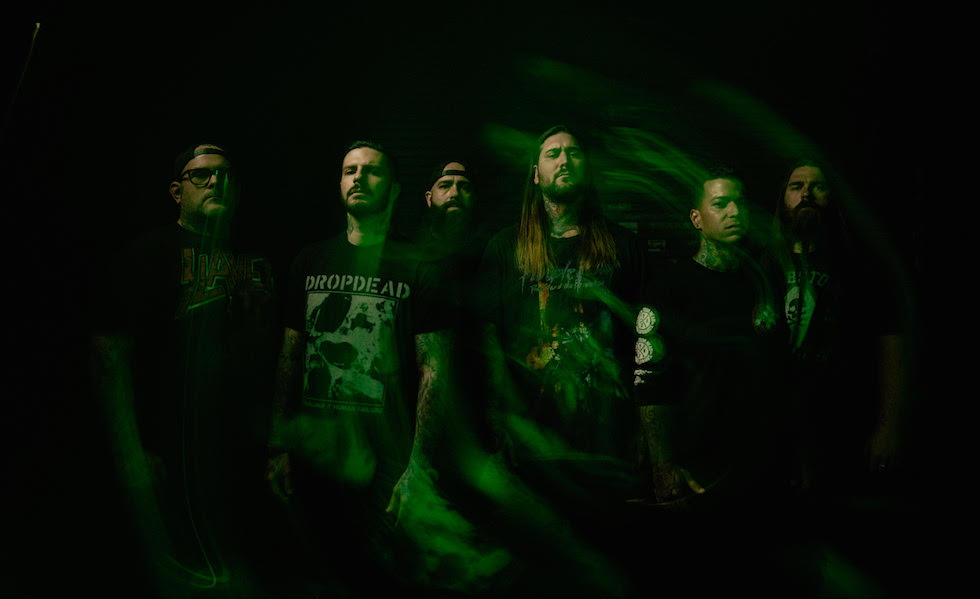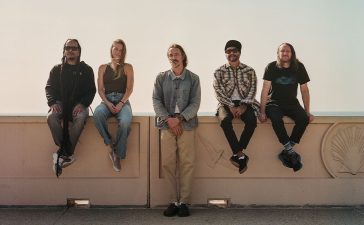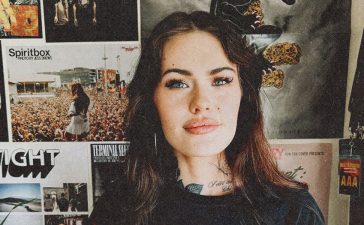The importance of balance in creating can’t be overstated, after all, when you think ‘balance’ is the fulcrum of two of the highest grossing films of all time, Avenger’s Endgame and Titanic. If you’ve been finding yourself drawn to Oh, What The Future Holds, the latest release from Fit For An Autopsy, there’s little doubt that’s on account of it’s respect of the law of balance, too.
Produced by guitarist Will Putney, Oh, What The Future Holds balances tones and moods as much as it does crushing instrumentals and sonic sparseness, stories of literal doom with metaphorical ones; Vicious attacks counted by impenetrable moments of defence. It’s a masterfully executed tightrope walk between too much and not enough that lesser bands plummet either side of.
As BLUNT would learn speaking with Putney, it was a balancing act well worth the effort.
There’s some of that commentary around ‘Oh What The Future Holds’, that you guys have really resonated with this release, potentially more so than other things you’ve put out. I wanted to see if you could quantify that; What was it about this process that made it a standout experience for you guys?
I think there was less time pressure on this one. Obviously with the pandemic and all of our touring being canceled. I didn’t feel like we were boxed in with any limitations on our time like we have been in the past. I’ve definitely gone from making Fit For An Autopsy music to just like, “I’ll squeeze it in around what I’m doing at the studio.” To, “No, I’m going to make sure I leave a month for the band to do this.” It was a way more relaxed process.
We obviously put the love into all the records that we do, but this one was just like there was no tour on the horizon. There was no deadline to meet, we got to do this. It was like, we really got to finally just make a record at our own pace. Which was really cool.
Steven King, or one of them, wrote he said, ‘The most important things to say are always the hardest’, listening to this album that it came to mind. There’s so many home truths, it’s very introspective: You say the important things. I wanted to know how that works for you guys. Was that an easy process?
I think a few years ago, I realized that there’s two approaches to dark and aggressive music…You have to point your finger at the thing and say, “Hey, this sucks.” And be mad at something. It’s like awareness raising. It calls people out on their wrongdoings. I think all of our music has purpose in the sense that we will always talk about something that affects us, or the world, or a group of people, or part of society.
But, then there is the internalized version of it: “Well, what does that do to you as a human?” You have to exist in this environment with this thing that’s evil or terrible, and how does that change you as a person? What does that make you feel like? It’s not on the attack all the time.
I realised a while ago, if you really want to drive stuff home you can’t just yell at stuff. You have to show how it really affects the human condition, how it affects you personally, how it changes people.
I started to inject that into lyrics, and I think I did that more on this one than I ever had before too. I took some abstracted approaches for it. I definitely moved some of the lyrical content away from just yelling at shit. Where I was actually like, I wanted to show a human that is being affected by this world too. Not just being mad at things. I think it lets people connect with these songs more. I think it adds weight to the music, to the topic you’re trying to convey. So for me, it’s a really important part of the process.
Cool. How literal is that? Can you look at the track listing and go: This track is a more of defensive track, this one’s an attacking one Or is it more so throughout the songs themselves individually, they ebb and flow between those coordinates?
It’s not so cut and dry. I mean maybe some of the songs it is. But there’s definitely one or two songs that are more literal in nature, and more like, “Okay, I kind of know what he’s talking about.” There’s one song called ‘Conditional Healing’, loosely based around addiction problems with pharmaceutical companies and opioid addiction.
It’s definitely a huge problem in our country, probably in yours too, unfortunately. But I wrote it from the perspective of someone in that state. And then it turns and becomes more of a literal song. It’s just an issue that, we’ve dealt with that, with some friends and some family over here.
I try to envision, I try to paint some of these more abstract, strange pictures about what these people are going through. And then it turns and becomes more aggressive and stuff. But I think it is that balance of both things – that’s where I enjoy writing the lyrics from anyway. They feel a little less one dimensional in that sense. So you get a nice balance from track to track.
Two Towers tells a story, not really based on any issue. That particular song was more about accepting that there are things in this world you’re never going to change. And it was written from this odd perspective. Like I had this big, more abstract vision of the story of, what if you can meet yourself in the future, what would you say to that person? And then I was like, “Well, you can’t do that.” So the song was based around, here’s my past self and my future self. And I’m trying to reach it, and I’m trying to talk to this guy, but we’re locked away in these two towers.
How important was commitment to an overarching ‘mood’ with this album, rather than following any specific genre ‘rules’?
It’s definitely intentional. It was challenging from a sonic perspective. To me, it was tricky to balance. I need a Sonic record that competes with modern, heavy metal productions. But I also need this pulled back thing, that I can let some of this melodic, moody, emotional stuff shine. And, because I have to place it somewhere in the middle. Like if I crush this record and it sounds like the most extreme, violent thing ever. That stuff’s going to suffer. And then if I go too soft, then the heavy stuff doesn’t have an impact. So it’s like a lot of moving parts to try to get both worlds of it to shine.
And you have to have sacrifices on both sides. And I’m sure it’s the style of mix that is like, okay, it’s not perfect for either one. But everything together, all the parts together, it gives you this nice takeaway. And when I mix Fit records. And when I’m designing these productions, I’m not really concerned with, I want the best sounding metal record of all time. It has to be this and that. Now it’s like, I just serve the songs and I want it to fit. And I want you to feel a certain way when you listen to it. And that’s all I care about. I want to just convey that. It’s a different type of approach than just a standard, more one dimensional type of production, and it’s way more challenging. Because it would be easy to just smash it all and go about my day.
This sense that you guys almost strapped yourself in for the ride with this one. How different did the final product turn out to what you began writing?
It’s funny because there’s so much thought into the demo process. Whatever that original idea is, it’s got to get done. Because it’s just me recording it. So it’s like the initial thoughts that go into some of these songs…But then once these instrumentals are done and I start working on lyrics, then changes start to happen with the music. Like, “Okay, now that I have this, it makes me want to go back and look at what the band’s doing here.” And there’s little details that change and things like that. But a lot of the original demo stuff is basically the record. And even some of the performances from the original stuff that I had written on this, made their way through to the end of the record too.
Because I was like, I had the idea, I was in that moment. It’s exactly what it’s supposed to be. I’m not rerecording it. It’s a pain in the ass. It sounds the way I want it to, and it’s done. So it was cool. I definitely kept more from the original writing session stuff than I had ever with it. I thought I was going to do that too. So I was set up for that this time.
Part of having free time was like, cool my writing process is in the studio here. So it was like, I might as well actually get it sounding pretty cool. And that way, if I capture anything worth keeping, I can keep it. And it worked great. I did wind up with a lot of those first ideas and made it all the way to the end.
Right. So you may have been strapped in for the ride, but you still had one hand on the wheel.
I had a loose hand on the wheel.






